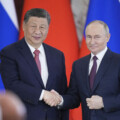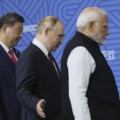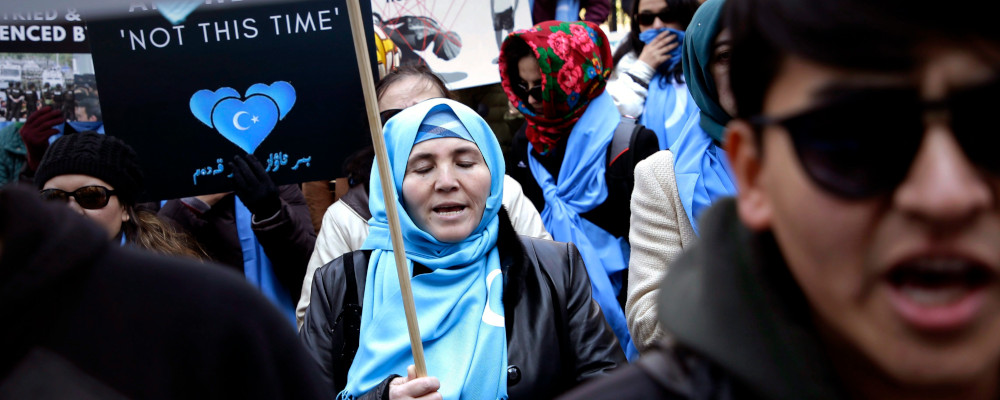For all of its high-minded aspirations, the disparate ways in which the United Nations has dealt with recent instances of repression and crimes against humanity highlight some of its most fundamental flaws. When institutions act to address similar circumstances in inconsistent ways, the credibility and effectiveness of the institution itself must be examined.
Contrast, for instance, the UN’s response to the plight of the Rohingya in Myanmar with its response to the persecution of the Uyghurs in Xinjiang, China.
In recent years, the UN has taken a spotlight to the persecution of the Rohingya population in Myanmar, sending an Independent International Fact-Finding Mission to uncover and report on the atrocities being committed there by the state. The investigative team released an official report in 2019 which stated that the 600,000 Rohingya remaining inside Myanmar face systematic persecution and live under the threat of genocide.Myanmar’s Rohingya Persecuted, Living under Threat of Genocide, UN Experts Say https://www.ohchr.org/en/press-releases/2019/09/myanmars-rohingya-persecuted-living-under-threat-genocide-un-experts-say?LangID=E&NewsID=24991
The report concluded that Myanmar incurs state responsibility under the prohibition against genocide and crimes against humanity, and should therefore be brought before the International Court of Justice for failing to honour its obligations under the 1948 Genocide Convention.
They also called on the UN Security Council “to refer Myanmar to the International Criminal Court or to establish an ad hoc tribunal, like the ones for the former Yugoslavia and Rwanda.”
At the same time, the genocide of the Uyghur Muslims in China has been ongoing and, within the last 50 years, the persecution has intensified. Uyghur Muslims are being detained in “re-education camps” by Chinese officials, with the goal of changing and taming the habits, thoughts, and opinions of the Uyghur people.China’s Repression of Uyghurs in Xinjiang https://www.cfr.org/backgrounder/chinas-repression-uyghurs-xinjiang In reality, these camps are more akin to detention centres.‘It’s hard to describe the pain’: Interview with a Chinese Olympic prisoner https://thehub.ca/2022-02-10/interview-with-a-chinese-olympic-prisoner/ More than 40 countries have challenged China over the abuses done against the Uyghur population.
Yet, the UN has yet to take meaningful action against the country even though it was created in 1945 to “maintain international peace and security, and to that end: to take effective collective measures for the prevention and removal of threats to the peace, and for the suppression of acts of aggression or other breaches of the peace.” United Nations Charter, 1945 https://www.un.org/en/about-us/un-charter#:~:text=United%20Nations%20Charter,force%20on%2024%20October%201945.
In response to the Uyghur genocide, the UN released a statement urging the Chinese government to “immediately cease any such measures that are not fully compliant with international law, norms and standards relating to human rights, including the rights of minorities.” Additionally, member states of the United Nations issued statements speaking out against the human rights abuses taking place in China, which was eventually followed by the request for China to allow access for observers into the Xinjiang region to determine the events taking place there. China has refused any investigation.
This tepid response leaves many questions. The UN has shown its capabilities to respond quickly and harshly toward other instances of genocide, such as the Rohingya genocide in Myanmar, yet why is there such little action being taken against China for its human rights abuses? In what ways can the UN speak out about the Uyghur genocide? What factors play a role in the UN’s response, or lack thereof?
In order to answer these questions, the basic structures and functions of the UN Security Council and the International Criminal Court must be discussed. These two branches of the UN are the most common avenues for pursuing action against a country’s harmful behaviour; however, while these have been used to condemn other countries and hold them accountable, neither of these are practically viable mechanisms for redressing the wrongdoings of China.
First, the UN Security Council seeks to address any threats to international peace and security, and is composed of fifteen members; five of which are permanent members, including China. Each member has one vote. But, for any action to be considered approved, all of the permanent members must vote in favour of the matter.
Here lies one of the major flaws of the United Nations. The result of this rule has allowed China to shut down any conversation surrounding a potential resolution on the Uyghur genocide. If a resolution were to be drafted, China would simply veto it and leave no route for challenging the country. Due to the makeup of the Security Council, any resolution regarding the Uyghur Muslims in China has no viability, cutting off one of the main avenues of action for the United Nations.
In addition to this, the structure of the International Criminal Court effectively disallows action from being taken against China. Crimes within the jurisdiction of the Court include the crime of genocide, war crimes, crimes against humanity, and crimes of aggression. However, China has not consented to the jurisdiction of the Court. This means they cannot be put on trial unless the Security Council puts forward a resolution that is referred to the Court. This option would be open to the Security Council—if China were not a permanent member.
The third way for the United Nations to take action against China is through its member nations speaking out. But China plays a large role in international affairs and it is difficult for member states to raise their voices against the country for fear of backlash and sanctions. China is a key lender to many countries and is one of the largest importers and exporters in the world. It uses its economic leverage as a global superpower to bully and coerce smaller countries into silence and acquiescence.
This underlying threat of retaliation has led to a lack of willingness to hold China accountable for the crimes that it has unmistakably committed. It is apparent that China is a wildly unpredictable player on the world stage unbeholden to the rules and norms of the current system.
It is also clear that there are major flaws within the structure of the United Nations—flaws that have been highlighted by the unchecked continuation of the Uyghur genocide. This is an issue that truly tests the international institutions in which we trust. There is much uncertainty in the global international order, but what is clear is that the status quo is untenable. Meaningful action is required to challenge the wrongdoings of countries like China, whether that happens through a reformed and strengthened UN or without it.
Recommended for You

Rudyard Griffiths and Sean Speer: Canada’s immigration consensus is shattering. Here’s why

‘Who are the most important balancing powers against China?’: David Frum on the end of U.S. unipolarity

‘Our way of life is being challenged’: Why Putin, Xi, and Kim’s military parade matters

‘Literally backslapping each other’: What the chummy meeting of Xi, Modi, and Putin means for geopolitics



